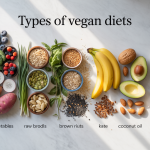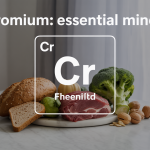Managing kidney disease requires careful attention to what you eat, as your food choices can protect your kidneys from further damage. This guide is designed for people with kidney disease, their families, and caregivers who want to understand which foods support kidney health and which ones to avoid.
When your kidneys struggle to filter waste properly, certain nutrients can build up in your blood and cause problems. The good news is that making smart food choices can help slow the progression of kidney disease and keep you feeling your best.
We’ll walk you through the essential nutrients you need to watch – like sodium, phosphorus, and potassium – and show you how to choose kidney-friendly vegetables, fruits, and proteins that taste great while supporting your health. You’ll also discover natural ways to add flavor to your meals without relying on salt, plus learn about the best beverages to keep your kidneys happy.
Essential Nutrients to Restrict for Kidney Health
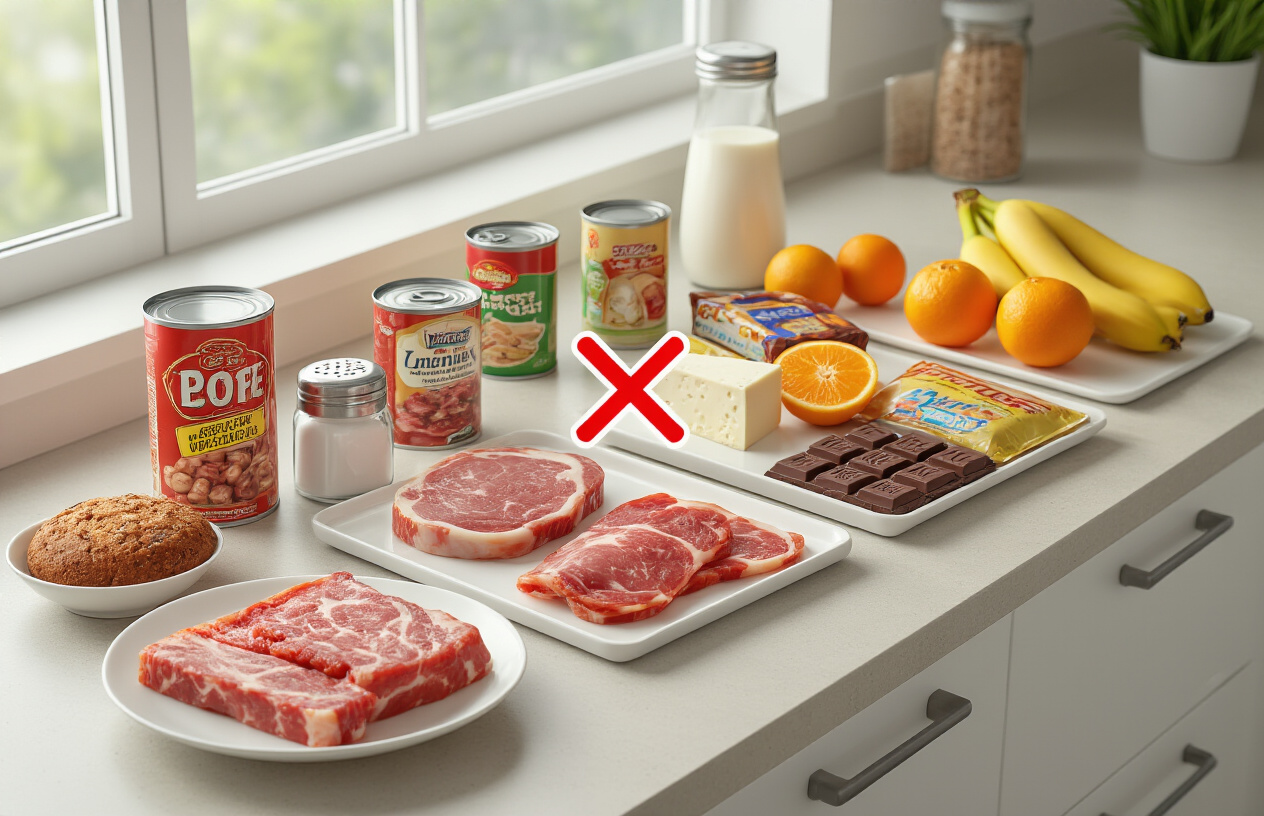
Limiting Sodium Intake to Reduce Kidney Strain
When kidneys are compromised, they struggle to efficiently remove excess sodium from the bloodstream. This creates a cascading effect where sodium accumulates in the body, leading to fluid retention and increased blood pressure that further strains already weakened kidneys. Managing sodium intake becomes crucial for breaking this harmful cycle.
People with kidney disease must avoid too much salt and sodium to effectively manage their condition. The kidneys’ reduced filtering capacity means that even moderate amounts of sodium can overwhelm the system. This restriction helps prevent the buildup of excess fluid in tissues and reduces the workload on compromised kidneys, allowing them to function more effectively within their limited capacity.
Managing Phosphorus Levels to Prevent Bone Disease
Phosphorus regulation represents another critical challenge for individuals with kidney disease. When kidney function declines, the body loses its ability to effectively remove excess phosphorus from the blood. Patients should avoid foods and drinks with too much phosphorus, as elevated levels can trigger serious complications.
High phosphorus levels in the blood can lead to calcium being pulled from bones, resulting in weakened bone structure and increased fracture risk. This mineral imbalance creates a dangerous cycle where bone disease develops alongside kidney dysfunction, making dietary phosphorus management essential for maintaining overall health.
Controlling Potassium to Maintain Heart Function
Potassium control becomes increasingly important as kidney disease progresses. The kidneys normally regulate potassium levels precisely, but when this function is impaired, dangerous accumulations can occur. Patients should avoid foods and drinks with too much potassium to prevent potentially life-threatening complications.
Excessive potassium levels can disrupt normal heart rhythm, leading to cardiac arrhythmias that can be fatal. Managing intake of potassium alongside other restricted minerals helps maintain cardiovascular stability while supporting remaining kidney function.
Balancing Protein Intake Without Overworking Kidneys
Protein management requires careful consideration in kidney disease. While protein is essential for maintaining muscle mass and overall health, it’s advised to avoid eating too much protein. When kidneys process protein, they produce waste products that must be filtered from the blood.
Compromised kidneys struggle to remove these protein waste products efficiently, leading to toxin buildup in the bloodstream. Managing intake of protein helps reduce this burden while ensuring adequate nutrition for bodily functions and healing processes.
Top Kidney-Friendly Vegetables and Fruits
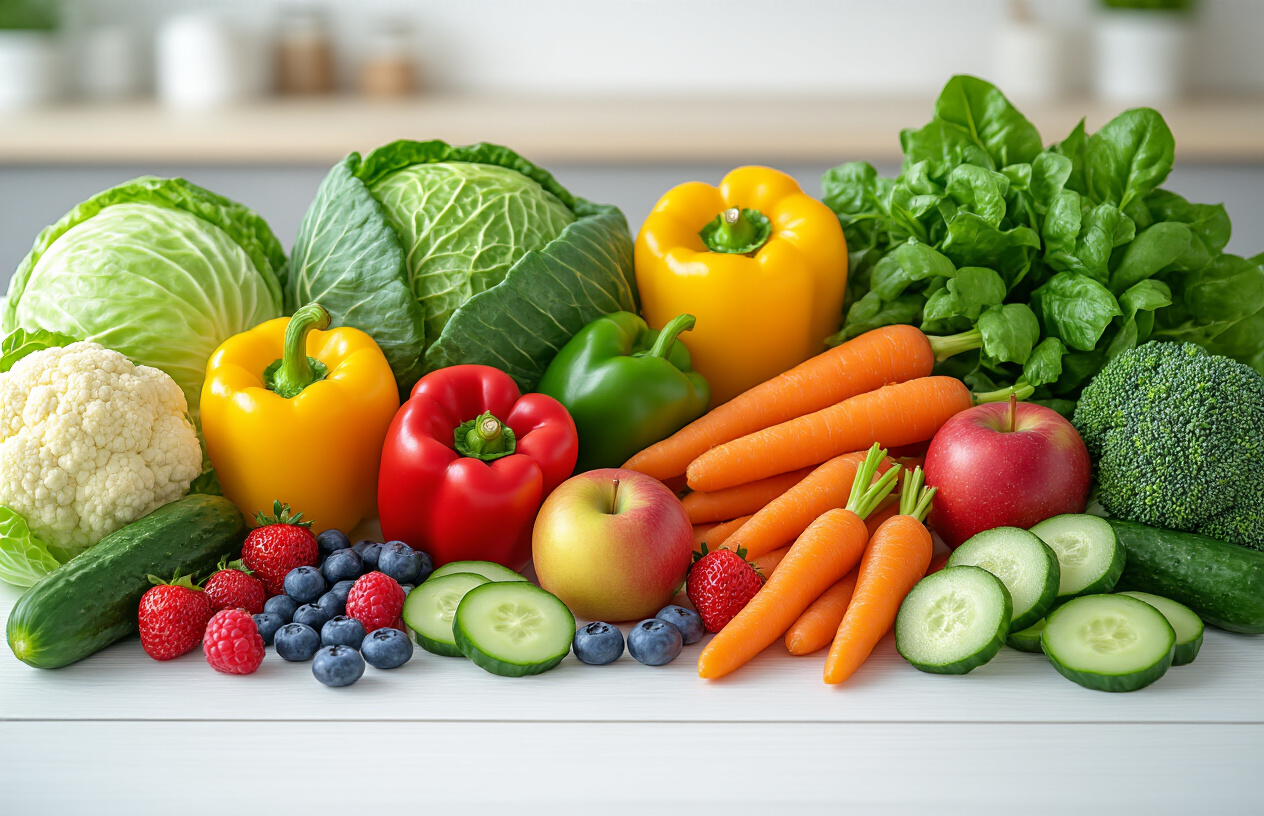
Low-Potassium Vegetables Like Cauliflower and Cabbage
Cauliflower stands out as an exceptional choice for individuals managing kidney disease due to its impressive nutritional profile while maintaining low potassium levels. This versatile vegetable provides essential vitamin K, folate, fiber, antioxidants, and anti-inflammatory compounds that support overall health. A 62-gram serving of boiled cauliflower contains only 9.3mg sodium, 88mg potassium, and 20mg phosphorus, making it an ideal low-potassium side dish that can be incorporated into various meal preparations.
Cabbage offers another excellent option, packed with vitamins, minerals, and powerful antioxidants. Research suggests that cabbage consumption may help manage blood sugar levels and reduce the risk of kidney and liver damage, making it particularly beneficial for those with compromised kidney function. A 70-gram serving of shredded savoy cabbage contains just 6mg sodium, 119mg potassium, and 18mg phosphorus.
Arugula deserves special mention as a low-potassium, nutrient-dense leafy green perfect for kidney-friendly salads. With only 5mg sodium, 74mg potassium, and 10mg phosphorus per 20-gram serving, it provides excellent nutritional value without overwhelming the kidneys. Turnips, when cooked properly, serve as another healthy kidney-friendly side dish option, containing 25mg sodium, 276mg potassium, and 41mg phosphorus per 78-gram serving.
Antioxidant-Rich Berries and Grapes for Protection
Now that we have covered essential low-potassium vegetables, antioxidant-rich fruits play a crucial role in supporting kidney health through their protective compounds. Blueberries emerge as a superfood for kidney patients, rich in anthocyanins—powerful antioxidants that combat oxidative stress and inflammation. These berries are naturally low in sodium, phosphorus, and potassium, with one cup (148g) containing only 1.5mg sodium, 114mg potassium, and 18mg phosphorus.
Red grapes provide an excellent source of flavonoids, compounds that may reduce inflammation and protect against heart disease—a common concern for individuals with kidney disease. The cardiovascular benefits are particularly important since kidney disease patients face increased heart disease risk. A half-cup serving (75g) of red grapes contains just 1.5mg sodium, 144mg potassium, and 15mg phosphorus, making them a safe and beneficial fruit choice.
Bell Peppers and Radishes for Vitamin C
Bell peppers deliver exceptional vitamin C content along with vitamin A and other antioxidants while remaining low in potassium—a perfect combination for kidney disease management. These colorful vegetables support immune function, which can be compromised in kidney disease patients. One medium red pepper (119g) contains less than 2.5mg sodium, 213mg potassium, and 27mg phosphorus.
Radishes complement this vitamin C powerhouse beautifully, being extremely low in both potassium and phosphorus while providing folate and vitamin C. Their crunchy texture and peppery flavor make them nutritious additions to any renal diet. A half-cup serving (58g) contains only 23mg sodium, 135mg potassium, and 12mg phosphorus.
Pineapple and Cranberries as Safe Fruit Options
With this nutritional foundation established, pineapple and cranberries represent two of the safest fruit options for kidney disease patients. Pineapple contains significantly lower levels of phosphorus, potassium, and sodium compared to many popular fruits like oranges or bananas. Beyond its favorable mineral profile, pineapple provides excellent fiber content and vitamin C, plus bromelain—an enzyme that may help reduce inflammation throughout the body. One cup (165g) contains only 2mg sodium, 180mg potassium, and 13mg phosphorus.
Cranberries offer unique benefits as they contain specialized phytonutrients that may prevent urinary tract infections—a common concern for kidney disease patients. These tart berries are exceptionally low in potassium, phosphorus, and sodium, with one cup (100g) of fresh cranberries containing just 2mg sodium, 80mg potassium, and 11mg phosphorus, making them an ideal choice for maintaining kidney health while enjoying flavorful, nutritious fruit options.
Best Protein Sources for Kidney Disease Patients
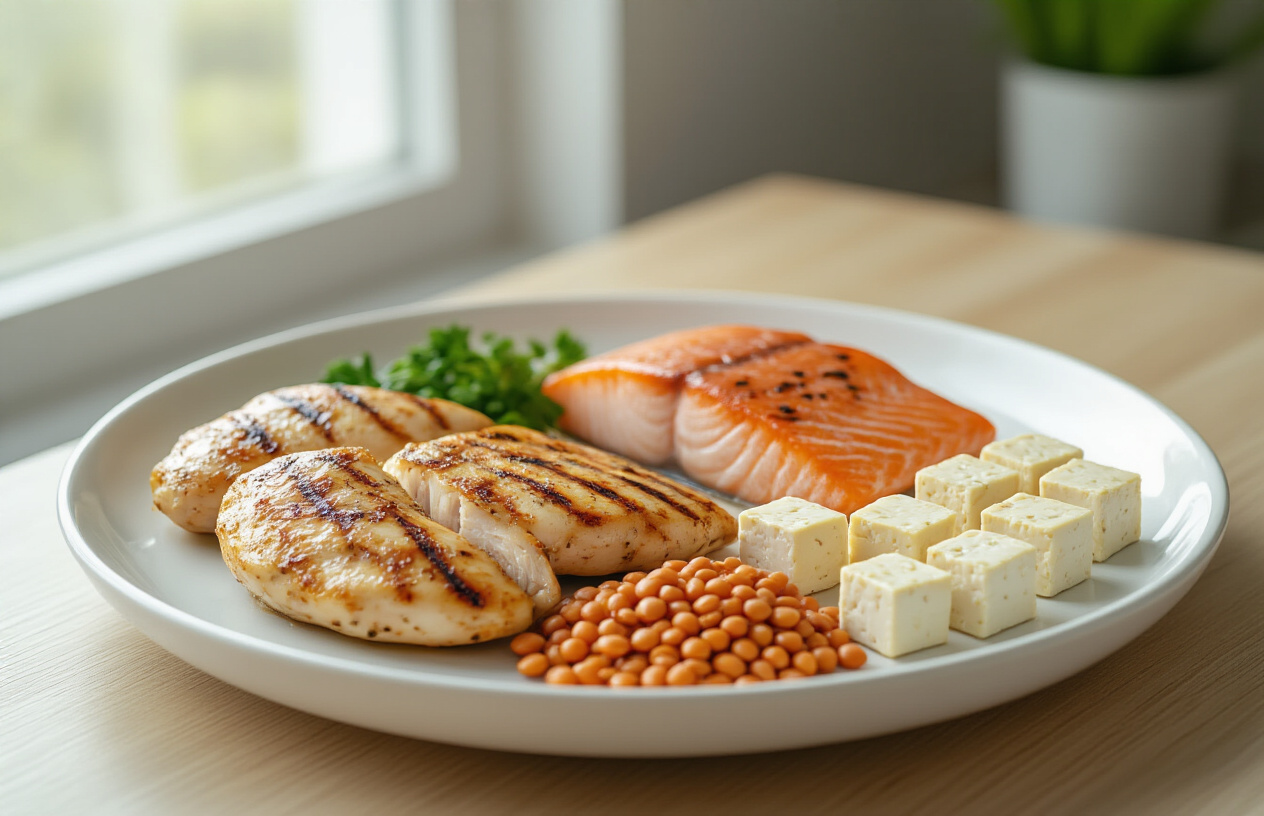
High-Quality Fish Like Sea Bass for Omega-3s
Sea bass emerges as an exceptional protein choice for kidney disease patients, offering high-quality protein combined with beneficial omega-3 fatty acids. These healthy fats play a crucial role in preventing diseases and boosting overall health for individuals managing long-term kidney conditions. A three-ounce (85g) serving of cooked sea bass delivers 20g of protein while maintaining relatively moderate levels of sodium at 74mg, potassium at 279mg, and phosphorus at 211mg. This nutritional profile makes sea bass particularly suitable for those following a renal diet, as it provides essential amino acids without overwhelming the kidneys with excessive minerals.
Egg Whites as Phosphorus-Free Protein
Egg whites represent one of the most kidney-friendly protein sources available, offering high-quality protein with remarkably low phosphorus content. This makes them significantly superior to whole eggs for individuals on a renal diet, as phosphorus restriction is often critical for kidney health management. Two large raw egg whites (66g) contain 7g of protein while contributing only 110mg of sodium, 108mg of potassium, and just 10mg of phosphorus. The minimal phosphorus content is particularly valuable since kidney disease patients typically need to limit this mineral to prevent bone complications and further kidney damage.
Lean Chicken Breast in Controlled Portions
Cooked, skinless chicken breast serves as an excellent protein source for kidney disease patients, though portion control remains essential to prevent overworking compromised kidneys. Healthcare professionals typically recommend limiting servings to 2-3 ounces (85g) to maintain optimal kidney function. An 85g serving provides 27g of protein while containing 64mg sodium, 220mg potassium, and 196mg phosphorus. This substantial protein content helps maintain muscle mass and supports overall health while keeping mineral levels within acceptable ranges for renal diets.
Shiitake Mushrooms as Plant-Based Protein Alternative
Shiitake mushrooms offer a savory, plant-based alternative to traditional meat proteins, making them particularly valuable for kidney disease patients seeking variety in their protein sources. These mushrooms provide essential nutrients including B vitamins, copper, manganese, selenium, and dietary fiber, while remaining lower in potassium, sodium, and phosphorus compared to other mushroom varieties like portabella or white button mushrooms. One cup (145g) of cooked shiitake mushrooms contains only 6mg sodium, 170mg potassium, 42mg phosphorus, and 2g protein, making them an ideal low-mineral protein option for those managing kidney disease.
Heart-Healthy Fats and Whole Grains for Kidney Support
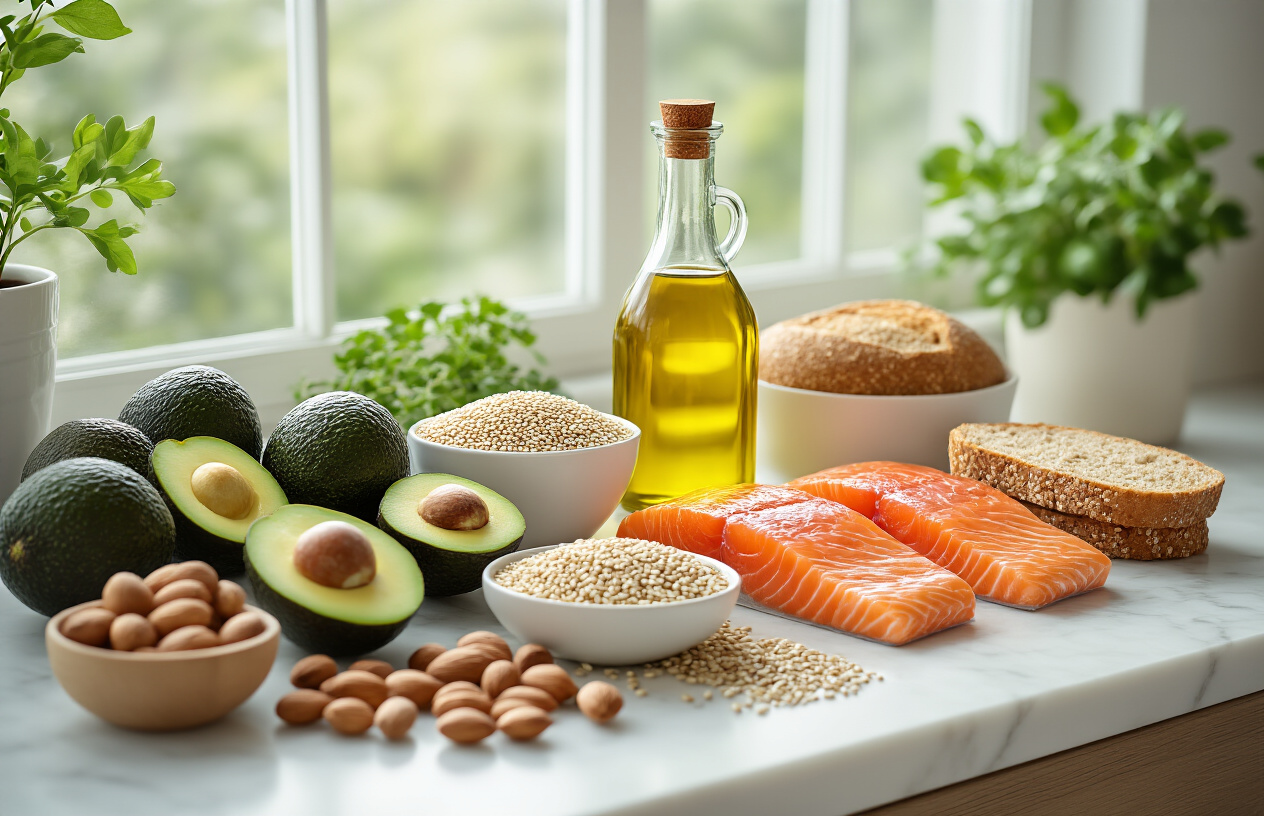
Olive Oil for Anti-Inflammatory Benefits
Olive oil stands out as an exceptional choice for individuals managing kidney disease, offering significant health benefits while being completely phosphorus-free. This golden liquid provides a rich source of vitamin E and unsaturated fats, particularly oleic acid, which delivers powerful anti-inflammatory properties crucial for kidney health. The anti-inflammatory effects of oleic acid can help reduce systemic inflammation that often accompanies chronic kidney disease, making olive oil a valuable addition to any kidney-friendly meal plan.
From a nutritional standpoint, olive oil is remarkably kidney-friendly. One tablespoon (14g) contains only 0.3mg of sodium, 0.1mg of potassium, and 0mg of phosphorus, making it an ideal cooking fat for those who need to monitor these key minerals. This minimal mineral content allows patients to enjoy flavorful meals without compromising their dietary restrictions.
Macadamia Nuts as Low-Phosphorus Nut Option
Now that we’ve covered healthy fats, macadamia nuts emerge as the optimal nut choice for people with kidney problems. Unlike peanuts or almonds, which can be problematic due to higher potassium and phosphorus levels, macadamia nuts provide a safer alternative while still delivering essential nutrients. These creamy nuts are packed with healthy fats that support cardiovascular health, which is particularly important since kidney disease is closely linked to heart disease.
Beyond healthy fats, macadamia nuts offer valuable nutrients including folate and essential minerals such as calcium, magnesium, copper, iron, and manganese. A one-ounce (28g) serving contains just 1.4mg sodium, 104mg potassium, and 53mg phosphorus, making them a reasonable choice when consumed in moderation as part of a kidney-friendly diet.
Buckwheat and Bulgur as Kidney-Friendly Grains
With this in mind, incorporating the right whole grains becomes essential for maintaining nutritional balance while supporting kidney health. Buckwheat represents an excellent low-potassium whole grain option that provides substantial nutritional benefits. This gluten-free grain is rich in B vitamins, magnesium, iron, and fiber, supporting overall health while accommodating dietary restrictions. A half-cup (85g) serving contains 0.8mg sodium, 391mg potassium, and 295mg phosphorus.
Bulgur serves as another kidney-friendly whole grain alternative, particularly valuable for those seeking to replace higher potassium and phosphorus grains in their diet. This whole grain wheat product delivers B vitamins, magnesium, iron, plant-based protein, and fiber. What makes bulgur particularly appealing is its impressive nutritional profile with minimal kidney-restricted minerals: a half-cup (91g) serving contains only 5mg sodium, 62mg potassium, and 36mg phosphorus, making it an excellent base for kidney-friendly meals while providing essential nutrients for overall health maintenance.
Natural Flavor Enhancers to Replace Salt
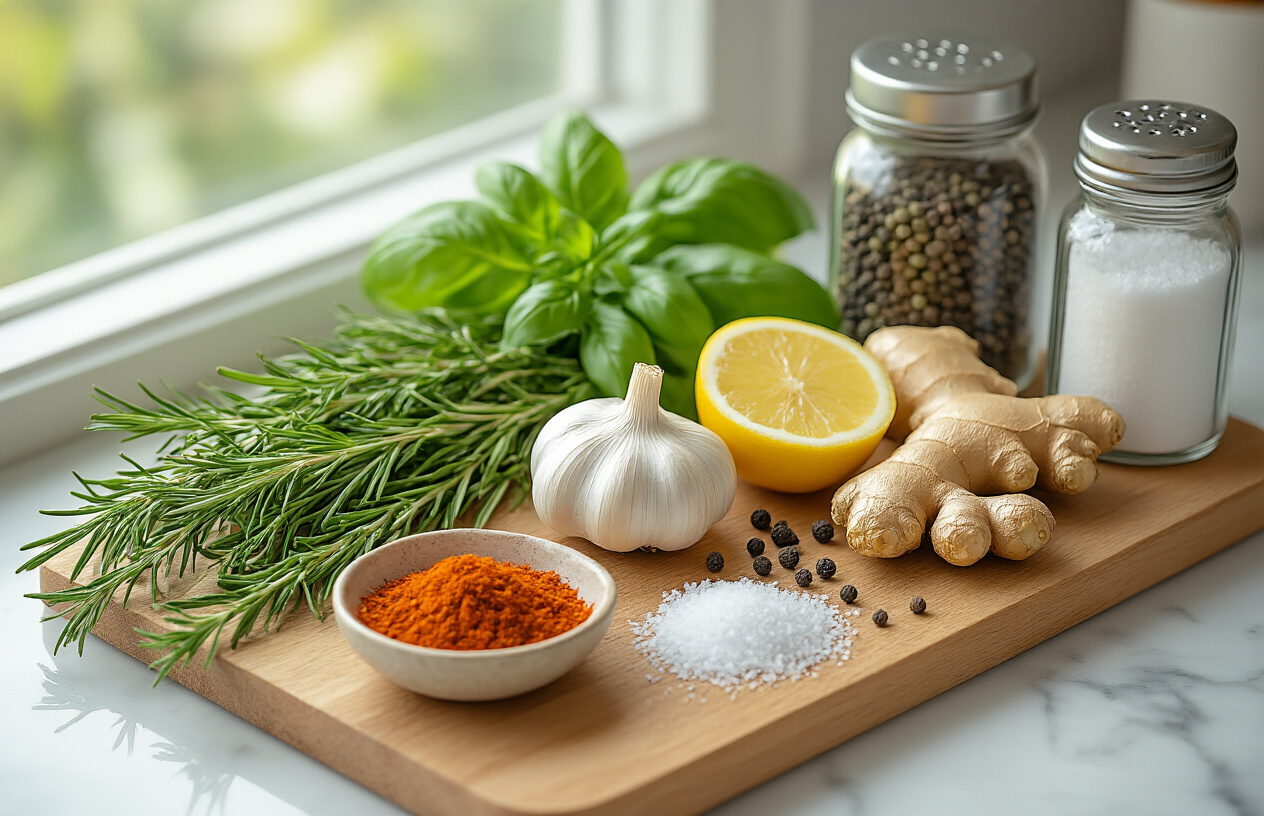
Garlic for Sulfur Compounds and B Vitamins
Garlic serves as an excellent salt alternative that transforms renal diet dishes with its robust flavor profile while delivering significant nutritional benefits. This aromatic bulb contains valuable nutrients including manganese, vitamin B6, and sulfur compounds that possess anti-inflammatory properties, making it particularly beneficial for individuals managing kidney disease. The sulfur compounds in garlic not only contribute to its distinctive taste but also provide therapeutic benefits that support overall health.
From a nutritional standpoint, three cloves of garlic (approximately 9 grams) contain remarkably low levels of problematic minerals for kidney patients: just 1.5mg sodium, 36mg potassium, and 14mg phosphorus. These minimal amounts make garlic an ideal seasoning choice for those following restrictive renal diets, allowing patients to enjoy flavorful meals without compromising their kidney health or exceeding daily mineral limitations.
Onions for Prebiotic Benefits and Flavor
Onions represent another sodium-free powerhouse for adding depth and complexity to kidney-friendly dishes. Beyond their ability to enhance flavor without salt, onions provide essential nutrients including vitamin C, manganese, and various B vitamins, notably folate. The prebiotic fibers found in onions offer additional digestive health benefits, supporting gut microbiome balance which can be particularly important for individuals with kidney disease.
The mineral profile of onions makes them exceptionally suitable for renal diets, containing only 3mg sodium, 102mg potassium, and 20mg phosphorus per serving. This low mineral content allows kidney disease patients to incorporate onions liberally into their meals without concern for mineral accumulation or dietary restrictions.
Fresh Herbs and Spices for Sodium-Free Seasoning
The combination of sautéing onions with garlic, olive oil, and fresh herbs creates a powerful flavor base that eliminates the need for salt while maintaining kidney health. This cooking technique maximizes the natural flavors of these ingredients, creating complex taste profiles that satisfy without compromising dietary restrictions. Fresh herbs and spices provide endless variety in sodium-free seasoning options, allowing patients to explore diverse cuisines while adhering to their renal diet requirements.
Optimal Hydration and Beverages for Kidney Health
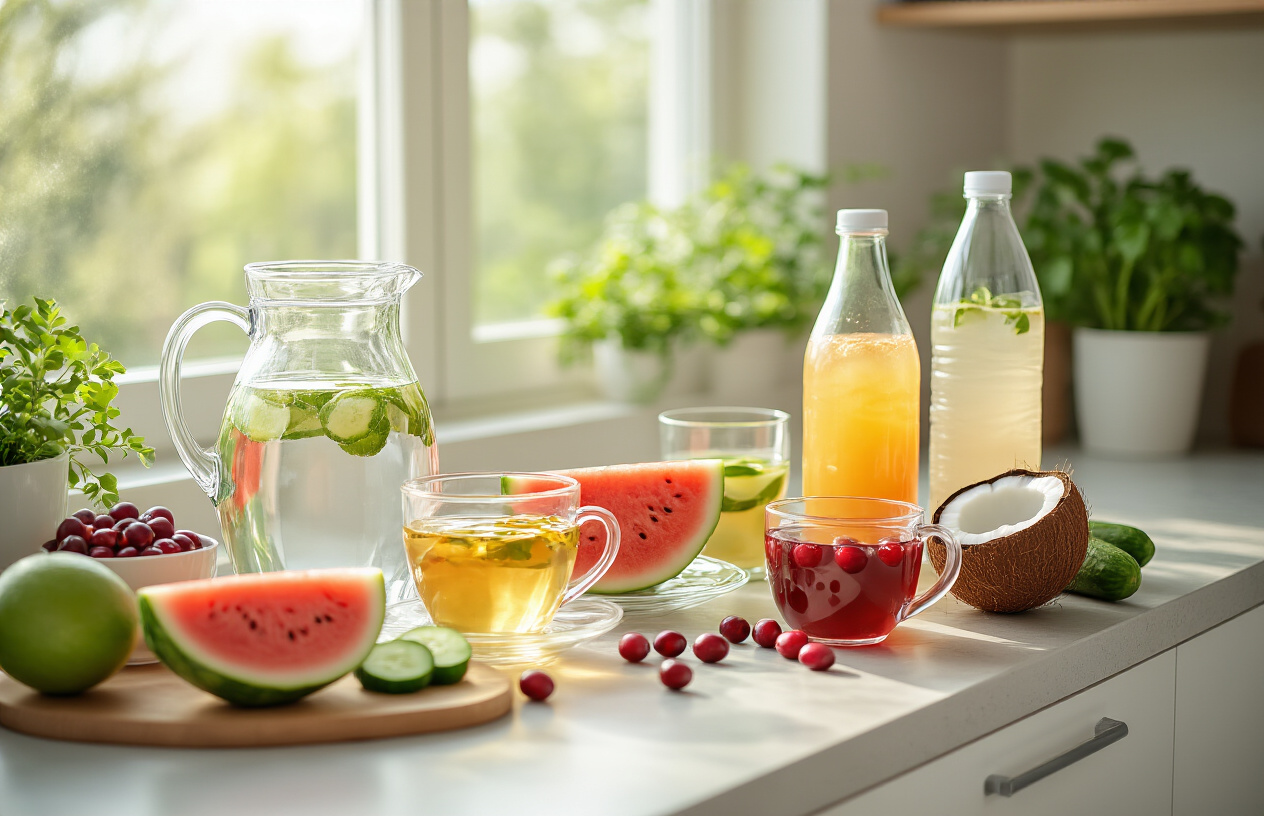
Water as the Primary Kidney-Flushing Beverage
Water stands as the gold standard for kidney health, serving as the most effective and safest beverage choice for individuals managing kidney disease. Unlike other beverages that may contain hidden minerals or additives, water provides the purest form of hydration without introducing additional potassium or phosphorus into your system. These minerals, while essential for healthy individuals, can become problematic when kidney function is compromised, as damaged kidneys struggle to filter and eliminate excess amounts effectively.
The kidney-flushing properties of water are unmatched in their simplicity and effectiveness. By maintaining adequate water intake, you support your kidneys’ natural filtration process, helping to dilute waste products and toxins that need to be eliminated from your body. This consistent flushing action reduces the burden on already stressed kidney tissues and helps maintain optimal blood chemistry levels.
For kidney disease patients, water consumption should be carefully monitored and tailored to individual needs, as some advanced stages may require fluid restrictions. However, when appropriate intake levels are maintained, water serves as the cornerstone of kidney-supportive hydration without the complications that other beverages might introduce.
Unsweetened Cranberry Juice for UTI Prevention
Now that we have covered the fundamental importance of water, unsweetened cranberry juice emerges as another beneficial beverage option specifically valuable for its protective properties against urinary tract infections. This specialized juice offers unique advantages through its rich antioxidant profile, which may help safeguard the urinary system from harmful bacterial colonization.
The antioxidants found in unsweetened cranberry juice work by creating an environment that discourages bacterial adhesion to the urinary tract walls. This natural defense mechanism is particularly important for kidney disease patients, who often face increased susceptibility to infections due to compromised immune function and altered urinary tract dynamics.
It’s crucial to emphasize the “unsweetened” aspect of this recommendation, as added sugars can complicate diabetes management and contribute to inflammation—both concerns that frequently accompany kidney disease. The natural tartness of unsweetened cranberry juice ensures you receive the beneficial compounds without unnecessary additives that could burden your kidneys or interfere with your overall health management plan.
Rice Milk Without Added Phosphorus or Potassium
With hydration fundamentals established, rice milk presents itself as a suitable alternative beverage option, provided it meets specific criteria essential for kidney health. The key consideration when selecting rice milk lies in choosing varieties that have not been enriched with potassium or phosphorus—two minerals that require careful monitoring in kidney disease management.
Unfortified rice milk offers the advantage of providing a dairy alternative without the natural phosphorus content found in traditional milk products. This makes it particularly valuable for individuals who need to limit their phosphorus intake while still enjoying a milk-like beverage for cereals, cooking, or drinking.
When shopping for rice milk, careful label reading becomes essential. Many commercial rice milk products are fortified with various vitamins and minerals, including potassium and phosphorus, to enhance their nutritional profile for the general population. However, for kidney disease patients, these additions can be counterproductive. Selecting plain, unfortified rice milk ensures you can enjoy this beverage while maintaining adherence to your kidney-protective dietary restrictions.
Foods to Avoid or Limit for Kidney Protection

Processed and Premade Meals High in Sodium
Processed foods and premade meals pose significant risks for individuals managing kidney disease, primarily due to their exceptionally high sodium content. These convenient food options often contain excessive amounts of added sodium as a preservative and flavor enhancer, making them particularly problematic for kidney health. The kidneys must work harder to filter out excess sodium, placing additional strain on already compromised kidney function.
Deli meats represent another category of processed foods that should be avoided or strictly limited. These products are typically loaded with sodium and other preservatives that can exacerbate kidney problems. When kidneys cannot effectively filter these substances, they accumulate in the body, potentially leading to fluid retention and elevated blood pressure.
Canned Foods with Added Salt
Canned foods present a similar challenge for kidney disease patients due to their high sodium content. The canning process often involves adding significant amounts of salt to preserve the food and enhance flavor. For individuals with compromised kidney function, these sodium levels can quickly exceed daily recommended limits.
However, there are practical strategies to manage canned food consumption. Opting for salt-free varieties whenever possible provides a safer alternative. When salt-free options aren’t available, thoroughly rinsing canned foods before consumption can help remove excess sodium, making them more kidney-friendly while still allowing some dietary variety.
Large Portions of High-Protein Foods
Protein management becomes crucial for kidney disease patients, as excessive protein intake forces the kidneys to work harder during the filtration process. Large portions of protein-rich foods, including meat and dairy products, can overwhelm compromised kidney function and accelerate disease progression.
The recommended approach involves limiting portions of meat and fish to 2-3 ounces per serving. This controlled portion size helps maintain adequate nutrition while preventing excessive strain on the kidneys. By moderating protein intake, patients can support their kidney health while still meeting their body’s essential nutritional needs.
Alcohol and Its Impact on Kidney Function
Alcohol consumption poses particular risks for individuals with kidney disease, making limitation or complete avoidance crucial for optimal kidney protection. Alcohol can negatively impact kidney function through multiple mechanisms, including dehydration, increased blood pressure, and interference with the kidneys’ ability to regulate fluid and electrolyte balance.
Beyond direct kidney effects, alcohol increases the chances of developing several other health problems that can compound kidney disease complications. These additional health risks create a cascading effect that can accelerate kidney damage and interfere with overall disease management strategies.
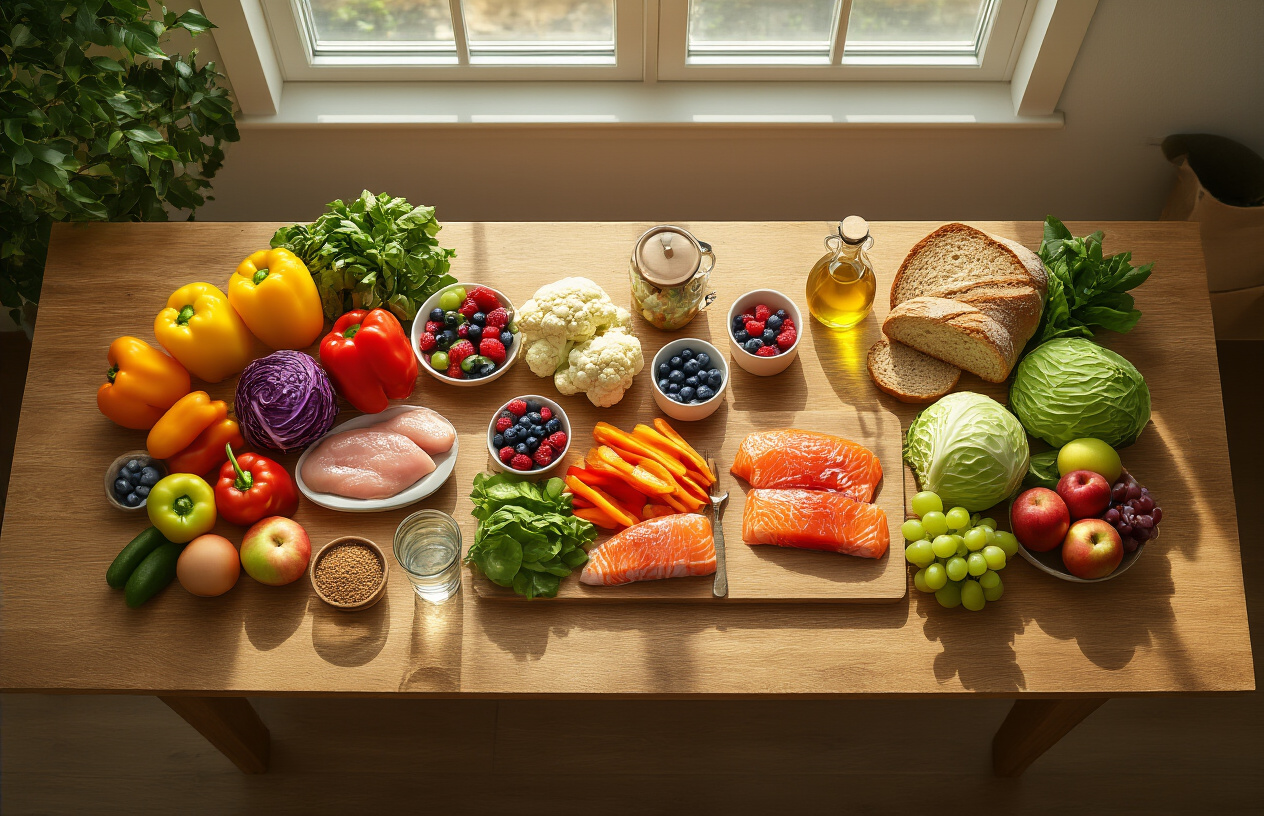
Managing kidney disease through proper nutrition requires careful attention to specific nutrients while ensuring your body receives essential vitamins and minerals. By focusing on kidney-friendly vegetables like cauliflower and bell peppers, low-phosphorus fruits such as blueberries and cranberries, and high-quality protein sources like egg whites and sea bass, you can support your kidney health while enjoying flavorful, satisfying meals. Incorporating heart-healthy fats like olive oil, choosing whole grains such as bulgur and buckwheat, and using natural flavor enhancers like garlic and onions will help you create delicious dishes without compromising your dietary restrictions.
Since kidney disease affects everyone differently and nutritional needs change as the condition progresses, it’s crucial to work closely with your doctor and a registered dietitian to develop a personalized meal plan. They can help you navigate the specific restrictions for your stage of kidney disease and ensure you’re getting proper nutrition while protecting your kidneys from further damage. Remember that while dietary changes may not completely heal your kidneys, following a well-planned renal diet can significantly slow disease progression and improve your overall quality of life.


